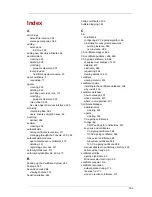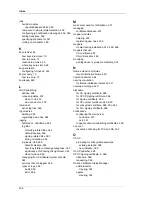
Glossary
530
data, even deleting or altering a single character, results in a different
value.
2. The content of the hashed data cannot be deduced from the hash.
operation
The specific operation, such as read or write, that is being allowed or
denied in an access control instruction.
output
In the context of the certificate profile feature, it defines the resulting
form from a successful certificate enrollment for a particular certificate
profile. Each output is set, which then dynamically creates the form
from all outputs configured for this enrollment.
P
password-based
authentication
Confident identification by means of a name and password. See also
authentication
,
certificate-based authentication
.
PKCS #7
The public-key cryptography standard that governs signing and
encryption.
PKCS #10
The public-key cryptography standard that governs certificate
requests.
PKCS #11
The public-key cryptography standard that governs cryptographic
tokens such as smart cards.
PKCS #11 module
A driver for a cryptographic device that provides cryptographic
services, such as encryption and decryption, through the PKCS
#11 interface. A PKCS #11 module, also called a
cryptographic
module
or
cryptographic service provider
, can be implemented in
either hardware or software. A PKCS #11 module always has one
or more slots, which may be implemented as physical hardware
slots in some form of physical reader, such as for smart cards, or
as conceptual slots in software. Each slot for a PKCS #11 module
can in turn contain a token, which is the hardware or software device
that actually provides cryptographic services and optionally stores
certificates and keys. Red Hat provides a built-in PKCS #11 module
with Certificate System.
PKCS #12
The public-key cryptography standard that governs key portability.
private key
One of a pair of keys used in public-key cryptography. The private
key is kept secret and is used to decrypt data encrypted with the
corresponding
public key
.
proof-of-archival (POA)
Data signed with the private Data Recovery Manager transport key
that contains information about an archived end-entity key, including
key serial number, name of the Data Recovery Manager,
subject
name
of the corresponding certificate, and date of archival. The
signed proof-of-archival data are the response returned by the Data
Recovery Manager to the Certificate Manager after a successful
key archival operation. See also
Data Recovery Manager transport
certificate
.
Summary of Contents for CERTIFICATE SYSTEM 8.0 - ADMINISTRATION
Page 42: ...20 ...
Page 43: ...Part I Setting up Certificate Services ...
Page 44: ......
Page 190: ...168 ...
Page 208: ...186 ...
Page 223: ...Part II Additional Configuration to Manage CA Services ...
Page 224: ......
Page 256: ...234 ...
Page 270: ...248 ...
Page 280: ...258 ...
Page 292: ...270 ...
Page 293: ...Part III Managing the Subsystem Instances ...
Page 294: ......
Page 408: ...386 ...
Page 438: ...416 ...
Page 439: ...Part IV References ...
Page 440: ......
Page 503: ...Netscape Defined Certificate Extensions Reference 481 OID 2 16 840 1 113730 13 ...
Page 504: ...482 ...
Page 556: ...534 ...
Page 564: ...542 ...













































